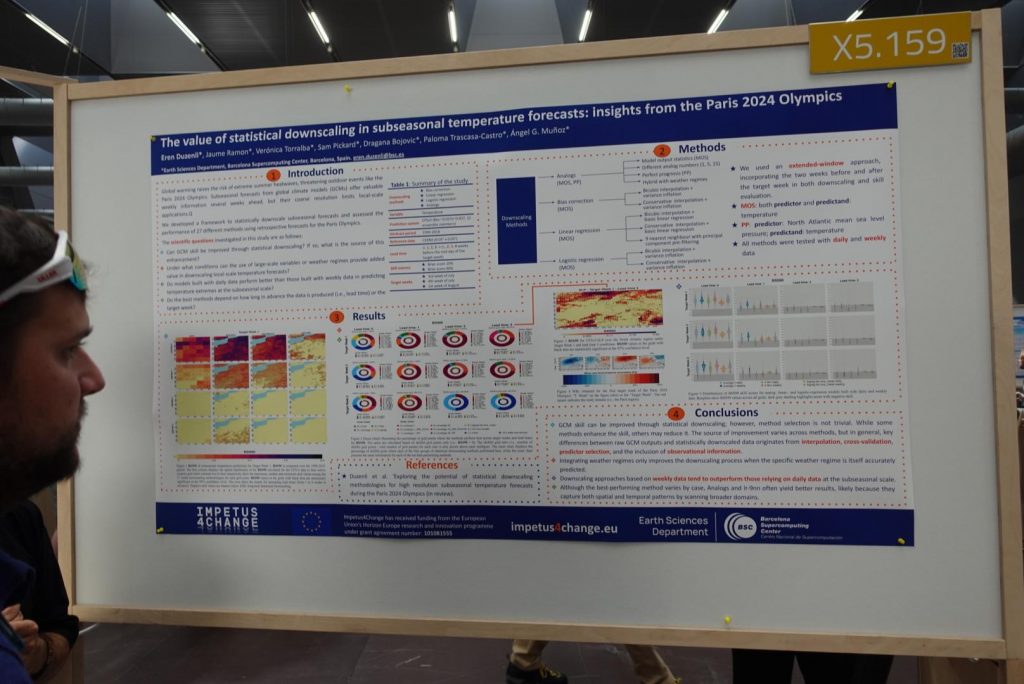Reflecting on EGU 2025: I4C’s contributions to advancing climate science
The EGU General Assembly 2025 brought together thousands of researchers, scientists, and practitioners worldwide to share insights into Earth, planetary, and space sciences.

Throughout the week in Vienna, I4C was actively engaged in oral and poster sessions. Our team shared updates on ongoing research and collaborative projects focused on improving climate data integration, enhancing decision-making tools, and translating complex climate science into usable knowledge for policy and society.
Click here to discover more about I4C sessions at EGU!
Highlights from Vienna
Throughout the week, I4C experts showcased their efforts to make regional climate models more useful for decision-making by developing stakeholder-relevant hazard indicators. Their work aims to translate complex climate data into actionable insights that help communities better understand and respond to climate-related risks.
A highlight of the presentations was a new study examining how urban areas affect daily temperature and rainfall patterns, an influence expected to grow with climate change. Using high-resolution climate models, researchers demonstrated that cities not only intensify daytime heat through the urban heat island effect but also shift the timing and distribution of rainfall. These findings carry significant implications for urban planning and climate adaptation strategies.

The week also featured a strong emphasis on co-evaluation of urban climate services. In a presentation by the Barcelona Supercomputing Center, researchers explored how climate scientists, decision-makers, and boundary agents assess the usefulness of these services.
The discussion underscored the importance of co-production and the vital role of boundary agents in aligning scientific outputs with real-world decision-making needs.
Click here to see the presentation!
Enhancing subseasonal temperature forecasts – Paris 2024 Olympics
I4C experts from Barcelona Supercomputing Center presented a recent study focused on improving the accuracy of temperature forecasts for large-scale events, using the upcoming Paris 2024 Summer Olympics as a case study. The research evaluates how various statistical downscaling methods can enhance both the spatial resolution and predictive skill of subseasonal temperature forecasts, those that extend from two weeks to a month ahead.

“We are trying to explore the potential of statistical downscaling in subseasonal climate predictions,” the researchers explained, “there are a lot of studies about downscaling, but for subseasonal, this is still so primitive. We are trying to understand their potential.“
By systematically analysing these techniques, the study aims to determine how effectively they can deliver more precise temperature predictions for specific locations and times. This, in turn, can support better preparedness and response strategies for major events such as the Olympics.
“Decision-makers can use numerical weather prediction data,” the team noted, “but for this, they will have data only a few days before the event day, which means they cannot take required measurements. That’s why we are focusing on subseasonal forecasts, which provide information a few weeks before.”

The researchers emphasised the critical role statistical downscaling can play in making climate forecasts more actionable for event organisers and public health officials, especially in the face of increasing climate variability. Accurate, longer-lead temperature predictions could be vital in planning for heatwaves and protecting public safety.
“Why the Paris Olympics? Because these are summer events and high-participation events,” the researchers said. “If we can predict possible heatwaves a few weeks before, maybe they can reschedule races or take other precautionary measures.”
If you missed it, take a look at our article published on the occasion of the Paris Olympics!
AFTER EGU AND BEYOND
To conclude, EGU 2025 served as a valuable platform for connecting with partners, gathering feedback from the research community, and identifying new opportunities for joint work.
While the full set of takeaways is still being consolidated, one emerging theme was clear: the need for tailored, high-resolution climate information that speaks to real-world needs, a challenge I4C is uniquely positioned to address.
We’d like to thank everyone who attended our sessions, engaged with our posters, or stopped by to speak with our team. The conversations and ideas shared at EGU 2025 reaffirm our belief in the power of open, collaborative science to drive meaningful change.
Looking forward to next year!
